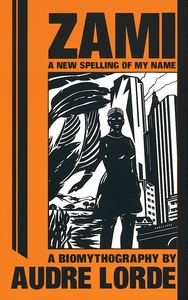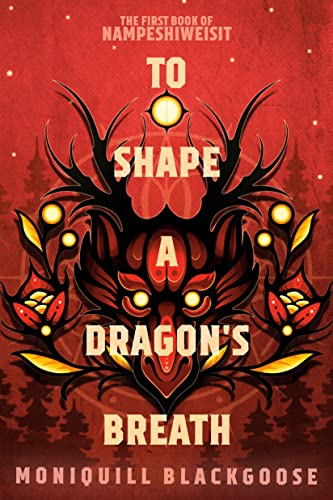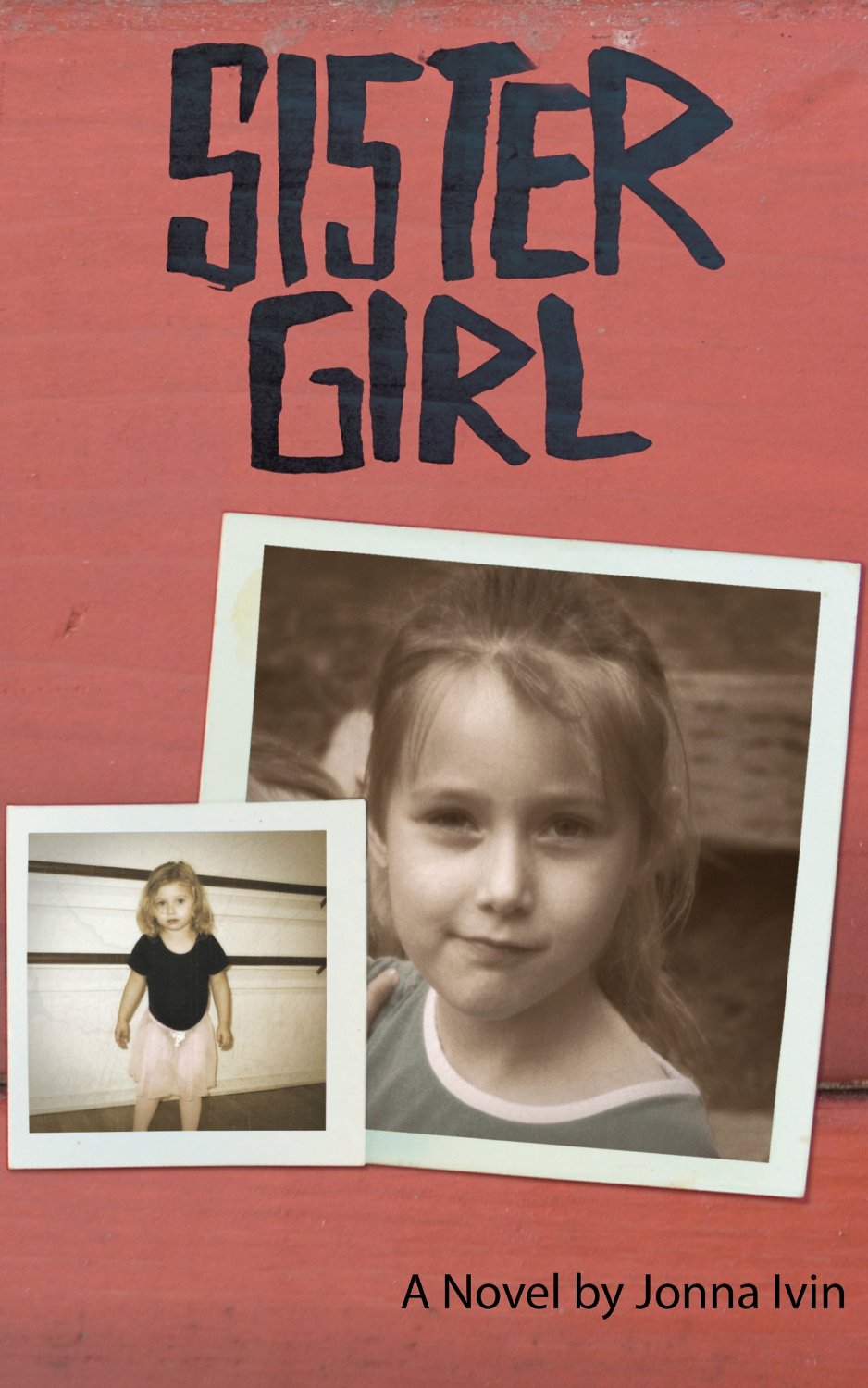Images of women flaming like torches adorn and define the borders of my journey, stand like dykes between me and the chaos. It is the images of women, kind and cruel, that lead me home.
Audre Lorde is a name that looms large in lesbian literature, in Black history, and in her legacy in poetry. I have read some of her essays and poems, but I hadn’t before read a long-form work by her. Zami is her autobiography, starting from early childhood and covering up to about her mid-20s. It was interesting to read about this period of her life, because I think some part of me imagined Lorde as appearing fully formed as the imposing figure she became. I’m also used to memoirs, which focus on one aspect of the author’s life, where this explores many subjects, from relationship to her mother, her education, her various jobs and relationships, and growing up as a Black gay woman in the United States in the 40s and 50s. I didn’t realize how early she wrote this: we don’t get to see her as the established poet she became, or as a lesbian activist or leader–instead, this is her journey to get there.
Lorde’s foundation in poetry is definitely visible here. While some passages are matter of fact, others are phrased poetically or even have whole excerpts of poems. I’ll admit that I was a little bit intimidated to pick this one up because of her reputation as both a poet and a theorist. This isn’t a book to speed through: like a poem, it’s packed with so much to pause and consider. Some lines I couldn’t understand, but that’s just the nature of reading poetry.
Lorde’s observations are often timeless or depressingly still timely commentary, while other aspects are firmly rooted in the time period she was coming of age. At some points she seems to have a wild and enviable youth: moving to Mexico on her own just for the love it, entertaining a rotating cast of down-on-their-luck friends piled in a room together, experimenting with drugs and relationships–while the next page will bring something truly horrific. Having to work a bad job as a young person is relateable, but having that job expose you to harmful levels of radiation (Lorde would develop cancer later in life) is not. Trying out polyamory, having endless lesbian processing, relationship miscommunication, that could all have been written yesterday. But having your partner go through shock therapy for her mental illness is very different. It was surreal to see historical events occur casually in her life, such as McCarthyism resulting in the FBI showing up at her door multiple times.
Her crispy hair twinkles in the summer sun as her big proud stomach moved her on down the block while I watched, not caring whether or not she was a poem… I loved her, because she moved like she felt she was somebody special, like she was somebody I’d like to know someday. She moved like how I thought god’s mother must have moved, and my mother, once upon a time, and someday maybe me.
The structure of Zami is a tour through the women that shaped Lorde’s life, from her mother to long-term relationships to brief friendships or conflicts. From the perspective of reviewing for the Lesbrary, it was interesting to see how Lorde’s sexual orientation comes up. This isn’t a “coming out” story–there’s no tearful reveal to her mother, no angst-ridden turmoil over choosing a label–it’s just a gradual exploration of her feelings for women. Her observation about lesbians I found to often be applicable still:
Meeting other lesbians was very difficult, except for the bars which I did not go to because I did not drink. One read The Ladder and the Daughters of Bilitis newsletter and wondered where all the other gay-girls were. Often, just finding out another woman was gay was enough of a reason to attempt a relationship, to attempt some connection in the name of love without first regard to how ill-matched the two of you might really be. Such were the results of loneliness…
That loneliness and confusion about coming out or just beginning relationships with women is, sadly, I think something lesbians and queer women still deal with.
In wonder, but without surprise, I lay finally quiet with my arms around Ginger. So this was what I had been so afraid of not doing properly. How ridiculous and far away those fears seemed now, as if loving were some task outside of myself, rather than simply reaching out and letting my own desire guide me. It was all so simple. I felt so good I smiled into the darkness. Ginger cuddled closer.
Reading about Lorde’s first relationships–intoxicating, all-encompassing, and burning at both ends–was painfully nostalgic. I wanted to reach through the pages and try to reason with her, but only because I want to do the same thing with my own past.
Each one of us had been starved for love for so long that we wanted to believe that love, once found, was all-powerful. We wanted to believe that it could give word to my inchoate pain and rages; that it could enable Muriel to face the world and get a job; that it could free our writings, cure racism, end homophobia and adolescent acne. We were like starving women who come to believe that food will cure all present pains, as well as heal all the deficiency sores of long standing.
Her romantic relationships are not the only women showcased in Zami, though. One person I found interested was a roommate who was dedicated to the feminist cause. Unfortunately, the feminist movement at the time was anti-gay, seeing at as somehow bougie–something only frivolous capitalists did. (Interestingly, since the government at the time seemed to associate with communism.) This roommate had a string of disastrous relationships with men, and Lorde speculates about how she must have felt seeing Lorde’s happy “incorrect” relationship, when she couldn’t make it work in a “correct” relationship. The schisms within “the movement” also strike a chord today:
Every one of the women in our group took for granted, and would have said if asked, that we were all on the side of right. But the nature of that right everyone was presumed to be on the side of was always unnamed.
Of course, the woman that played the biggest role in her early life was her mother. Lorde’s mother is almost a mythic figure in these early chapters–fitting, for how a young child perceives their parents. She commands attention and respect. She is strong, unrelenting, and Lorde would grow up to clash with her–then we see very little of her after Lorde’s teenage years. This makes sense from a real life perspective, but from a story view, I wanted to see more of her. Unsurprisingly, racism plays a major role in this narrative, and we see how Lorde’s parents try to shield her from it. When white people in the street spit on 4-year-old Audre’s jacket, her mother wipes it off (keeping a handkerchief for this purpose) and chides people for carelessly spitting on the street and missing. When Audre asks to eat in the dining car, her parents say it’s too expensive–never mentioning that it was illegal for them as a Black family to each there. Of course, they can’t protect Lorde from the everyday racism of growing up Black in the 40s and 50s, but it did confuse her about the source of these common indignities. As a child, she internalized her ill treatment by others as something wrong with her personally, having no words for racism.
Once we talked about how Black women had been committed without choice to waging our campaigns in the enemies’ strongholds, too much and too often, and how our psychic landscapes had been plundered and wearied by those repeated battles and campaigns.
It wasn’t until Lorde grew up, as a teenager and young adult, that she began to really understand how she was treated differently as a Black woman. She dreams of going to Mexico, working grueling, mind-numbing jobs to save up the money. Once there, she revels in being able to look around and be surrounded by Brown faces, by people who were friendly and curious about her instead of hostile.
Lorde faces the intersecting oppressions of being Black, gay, and a woman, finding very few people who can relate: she explains that most Black lesbians were closeted. Being a Black woman was a difficult enough hand to play, and most say being Black, gay, female, and out as suicidal. In lesbian circles, her Blackness is erased. Her white girlfriend is confident that being gay is the same as being Black: they’re both outsiders. Lorde can’t find the words or strength to fight her on this. The book ends with a sexual encounter with another out Black lesbian, and although it is a brief relationship, it’s a sigh of relief to see her find a connection where she doesn’t have to explain or hide any aspect of herself.
I remember how being young and Black and gay and lonely felt. A lot of it was fine, feeling I had the truth and the light and the key, but a lot of it was purely hell.
There were no mothers, no sisters, no heroes. We had to do it alone, like our sister Amazons, the riders on the loneliest outposts of the kingdom of Dahomey. We, young and Black and fine and gay, sweated out our first heartbreaks with no school nor office chums to share that confidence over lunch hour. Just as there were no rings to make tangible the reason for our happy secret smiles, there were no names nor reason given or shared for the tears that messed up the lab reports or the library bills.
We were good listeners, and never asked for double dates, but didn’t we know the rules? Why did we always seems to think friendships between women were important enough to care about? Always we moved in a necessary remoteness that made “What did you do this weekend?” seem like an impertinent question. We discovered and explored our attention to women alone, sometimes in secret, sometimes in defiance, sometimes in little pockets that almost touched (“Why are those little Black girls always either whispering together or fighting?”) but always alone, against a greater aloneness. We did it cold turkey, and although it resulted in some pretty imaginative tough women when we survived, too many of us did not survive at all.
Zami is not an easy read. Lorde goes through some horrific things, including an unsafe illegal abortion. Trigger warnings for pedophilia, an incest fantasy, self-mutilation, racism, and homophobia.
It’s also a book that asks to be read slowly and thoughtfully. I feel like I’ve just skimmed the surface of it. Don’t expect this to be Audre Lorde’s full story–it’s more like the prologue to the woman we remember her as today.
I also wanted to shout out Autostraddle’s 2020 feature, the Year of Our (Audre) Lorde, where every month, Jehan examines one of Lorde’s essays or poems and discussed how it is relevant today for queer and trans people of colour. I highly recommend it.
I look forward to reading more of Lorde’s work, especially her poetry, though I now know to be prepared for some slow reading, leaving lots of time for contemplation. Have you read any of Audre Lorde’s books? What did you think of them?


